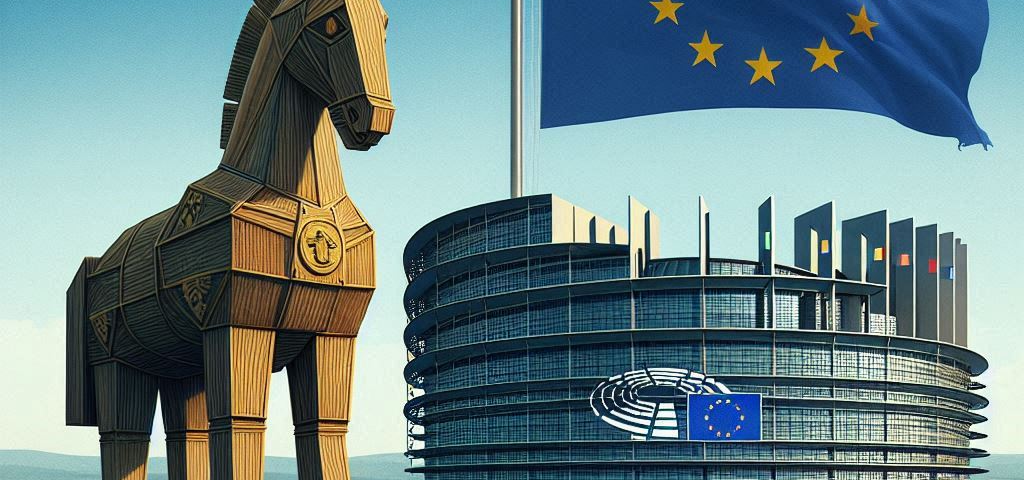Rezi Topuria
This article is auto-translated, we recommend to read it in original Georgian.
Introduction
2024 is the biggest election year in the world. This year, elections will be held in 74 countries and almost half of the world’s population will participate. Along with other important elections, on June 6-9, up to 400 million voters in 27 EU countries will be able to elect their MEPs.
This European Parliament election will be particularly interesting due to many factors. This will be the first election after several major “crises” that have fundamentally affected the politics of the EU and its member states, such as Brexit, the COVID-19 pandemic, Russia’s full-scale invasion of Ukraine, and the ongoing conflict in the Middle East. At the same time, these elections are made even more interesting by the rise of far-right parties in various European countries. It is the ultra-rights who are predicted to obtain the title of the main winner in this election.
Since the growing influence of the mentioned ideological group in European politics is a subject of special discussion today, this blog will review the electoral chances of the far-right and the results of these elections for both Europe and Georgia.
Current Situation in EP
The European Parliament is one of the main foundations of the EU bureaucracy. The European Parliament is the key institution of the European Union, which plays one of the main roles in EU legislation, oversight, and budgeting. Together with the Council of Europe, the European Parliament is the body where laws are developed and annual budgets are drawn up. The European Parliament also exercises democratic oversight over other EU institutions, monitors the implementation of laws, and ensures financial accountability. It is the only international organizational platform in which members are elected by universal suffrage. It should also be noted that an unprecedented number of people (up to 373 million) participate in these elections.
After the elections, elected deputies from different countries unite in political groups. To create a political group, at least 25 MEPs are required and elected in at least one-quarter of the EU member states (seven countries).
Currently, there are seven groups in the European Parliament, and the preliminary forecast shows that all seven will be able to meet the minimum criteria needed to create groups in the 2024 elections as well:
● European People’s Party (EPP) – 178 seats;
● Socialists and Democrats (S&D) – 140 seats;
● Renewed Europe (Renew – former ALDE) – 102 seats;
● Greens/European Free Alliance – 72 seats;
● European Conservatives and Reformists (ECR) – 68 seats;
● Identity and Democracy (ID) – 59 places;
● Leftists – 37 seats;
49 mandates are currently allocated to MEPs who are not members of any group.

Who are the ultra-right?
In the wake of the crises in Europe, the dissatisfaction of the population with the existing political elites of their countries is visible, as they feel increasingly neglected, at the same time we see the growth of the popularity of far-right parties, not only in the public space but also in governance. As recent examples, we can consider the Fratelli d’Italia (Brothers of Italy) in Italy or the PVV (Party for Freedom) in the Netherlands. In some countries, significant success has been achieved at the regional and municipal level, such as Vox in Spain.
At this stage, the far-right populists are leading the polls in nine member states (Austria, Belgium, the Czech Republic, France, Hungary, Italy, the Netherlands, Poland and Slovakia) and are likely to take second place in nine other countries (Bulgaria, Estonia, Finland, Germany, Latvia, Portugal, Romania, Spain and Sweden).
Accordingly, there has been more talk about a radical “turn to the right” of the European Parliament in the 2024 elections, which, in turn, will change many things in European politics.
At this point , there are two far-right political groups in the European Parliament – European Conservatives and Reformists (ECR), and Identity and Democracy (ID).
Identity and Democracy (ID) is a relatively new far-right, nationalist, populist, and Eurosceptic group founded in 2019, which includes such well-known far-right parties as Marine Le Pen’s National Union, Matteo Salvini’s League, Geert Wilders’ Party for Freedom, Herbert Kickley’s Freedom Party of Austria and An alternative to Germany.
The group’s stated priorities are “protecting the sovereignty of European nations, creating jobs, increasing security.” ID s trongly opposes illegal immigration and demands regulation of legal immigration, and also considers the potential Islamization of Europe as a threat and actively fights EU bureaucracy.
The group is skeptical of EU enlargement (it strongly opposes the possible accession of Turkey) and rejects the idea of the EU moving towards a European superpower, which in turn involves even closer integration of EU member states on foreign and domestic policies as well as defense and fiscal policies.
The mentioned group currently has 59 mandates, however, it is expected to grow , and according to various research , it may reach 98 mandates.
The European Conservatives and Reformists (ECR) has been around since 2009 and is a relatively mild Eurosceptic group. The group strongly opposes the EU’s current integration policy, further enlargement, the idea of a federalist EU, and as well as EU interference in national and domestic affairs. The ECR also e supports tougher immigration policies.
The ECR is seen as a kind of united right-wing platform, which includes socially conservative, right-wing populist, liberal-conservative , Christian Democratic, far-right and national conservative parties. Some of the famous parties that you will find in the ECR are Polish Law and Justice, Brothers of Italy, and Sweden Democrats.
What are the chances of the far-right in the 2024 elections?
According to preliminary forecasts, the European People’s Party (EPP) and the Socialists and Democrats (S&D) will take the first and second places in the European Parliament elections. However, while currently the ID and ECR are the fifth and sixth largest groups in the European Parliament, according to the latest ECFR forecast, analysts predict 98 seats for the ID and 85 seats for the ECR. Accordingly, these groups may become the third and fourth largest groups. In this case, they would have 25% more MEPs in total, more than the EPP or the S&D. This can cause a serious change in European politics.
At the same time, we should not forget the MEPs and parties that do not yet belong to any political group. One such example is Viktor Orbán’s FIDE party, with its 14 MEPs. In 2021, Fidesz and the EPP will part ways, and there is an opinion that Orbán may join one of the far-right groups.

What influence can the far-right have in the new European Parliament?
The growing trend of the popularity of the far-right is clearly upward. The Swedish think tank Timbro calculated that if the support of the far-right and populists in the EU was around 10 percent in the 1950s, by 2023 it will be more than a quarter, around 27 percent.
Against this background, the question naturally arises as to what influence they may have on European politics.
Although the ECR and ID may collect more than 180 seats in total, their unification in the form of a super coalition is difficult to imagine. ECR and ID have a similar vision on some issues, for example, we can cite immigration policy and the postponement of green legislation. However, the disagreement and conflict between these two groups is much greater.
The constituent parties of the ECR are mostly populist, nationalist, and/or conservative parties that are either currently or have been in government positions in the recent past. Some of them are critical of the EU, but there are still mild Eurosceptics.
Most of the members of the ID are ultra-right parties, with distinct nationalist and anti-EU politics. If the ECR considers the existence of the EU as a compromise, some of the constituent parties of the ID will openly oppose the idea of the EU, for example, the AfD often talks about the “Dexit” (Germany’s withdrawal from the EU) referendum.
One of the main areas of difference between the two groups is their relationship with Russia. The ECR is strongly in favor of anti-Russian policies (the most prominent of their members in this regard is the Polish Law and Justice Party), while the parties of the ID take more pro-Russian positions (especially Le Pen’s party).
Disunity between Orban and Fidesz also causes differences. ID has officially invited Orbán’s party to its group, however, Orbán wants to merge with ECR. At the same time, there are differences of opinion among the ECR member parties. The ECR includes parties that would like to see Fidesz in their ranks (e.g. Polish Law and Justice, Italian Brothers), but also smaller parties that threaten to leave the union if Orbán is accepted (e.g. Sweden Democrats, Czech Civic Democracy Party).
Thus, at this stage, a coalition between ECR and ID is difficult to imagine
If they don’t have a coalition, what then…?
However, even though the far-right will most likely fail to form a unified super-coalition as a result of these elections, their rise in popularity is still a noteworthy event.
The main problem with the rise in popularity of the far-right is that, while the ECR and ID groups themselves will not be able to push their agenda directly (they won’t have enough votes to do so), as their support grows, European mainstream politics will move further and further to the right. For example, far-right discourse has already prevailed on immigration in the EU. Presumably, the same awaits climate policy. Within the mainstream EPP, there is already some opposition to the Green Deal, and these differences of opinion will only grow.
The same can happen with foreign policy and security issues.
In the past, far-right associations tended to be more pragmatic and single-issue focused, which limited long-term collaborations. Now, with an increased united front, they may choose a more strategic approach and increase their decision-making power.
Thus, although populist, anti-European forces will not be able to direct European politics, they have a great chance to block political changes that are unacceptable to them. Mainstream parties and groups will have to make a series of concessions on climate, migration, economic, and social issues so that the whole European machine does not simply come to a halt. Such activities can further increase the support of the far-right. Thus, the EU elections of 2024 can be seen as a preparatory period for the far-right in the upcoming elections . At the same time, their growing popularity further weakens mainstream parties and leaders, changing the style and agenda of political communication at both national and EU levels.

Impact on Georgia
And finally, what impact will the growing popularity of the far-right and the expected rise in the European Parliament elections of 2024 have on Georgia?
It is clear that the growth of the mandates of the far-right and the additional mainstreaming of their political agenda will play a role in the foreign policy of the European Union. Firstly, this would result in a less robust EU, which would make it difficult to consturct clear decisions. One aspect that is clearly highlighted and which will have an indirect impact on Georgia is related to the support of Ukraine. As already mentioned, there are quite a few pro-Russian parties in the ID. On the one hand, it will not be enough for Brussels to completely refuse to support Ukraine, however, in the background of long-term assistance to Ukraine, some of the far-right parties will try to conduct more nationalistic policies within their own countries, which will make it difficult for European governments to aid Ukraine withadditional funds . As a result, support for Ukraine is expected to be relatively modest. Georgia, along with Ukraine and Moldova (so far) is considered a trio of the Eastern Partnership, and the policy of the European Parliament in relation to Ukraine will play a larger role in the Eastern Partnership between these states .
At the same time, essentially new (potential) initiatives such as European defense, which is on the EPP agenda, will likely face significant opposition from the far-right and their implementation in practice will become virtually impossible.
The most important aspect for Georgia is the future enlargement of the European Union. In this regard, as a result of the 2024 elections, we will see more (soft) Eurosceptics in the mainstream political groups in the European Parliament, while in the far-right we will see even more strict Eurosceptics, who want not only the future expansion of the European Union, but also to minimize the role of the European Union in general.
At the same time, as already mentioned, the growth of the popularity of the far-right forces the mainstream parties to move their political agenda further to the right, the same can be seen in Georgian politics. The current government of Georgia is already showing its Eurosceptic sentiments, and the growth of far-right discourse in Europe will make it even easier for anti-European governments to justify their Euroscepticism. At the same time, the government may justify its far-right policy under the label of Europeanism.
However, we should also mention that the influence on European politics depends not only on the European Parliament elections, but also on the American presidential elections. If Trump wins, we may see even less American involvement in global (and therefore European) politics, which will make things even more difficult for the far-right European Union.




